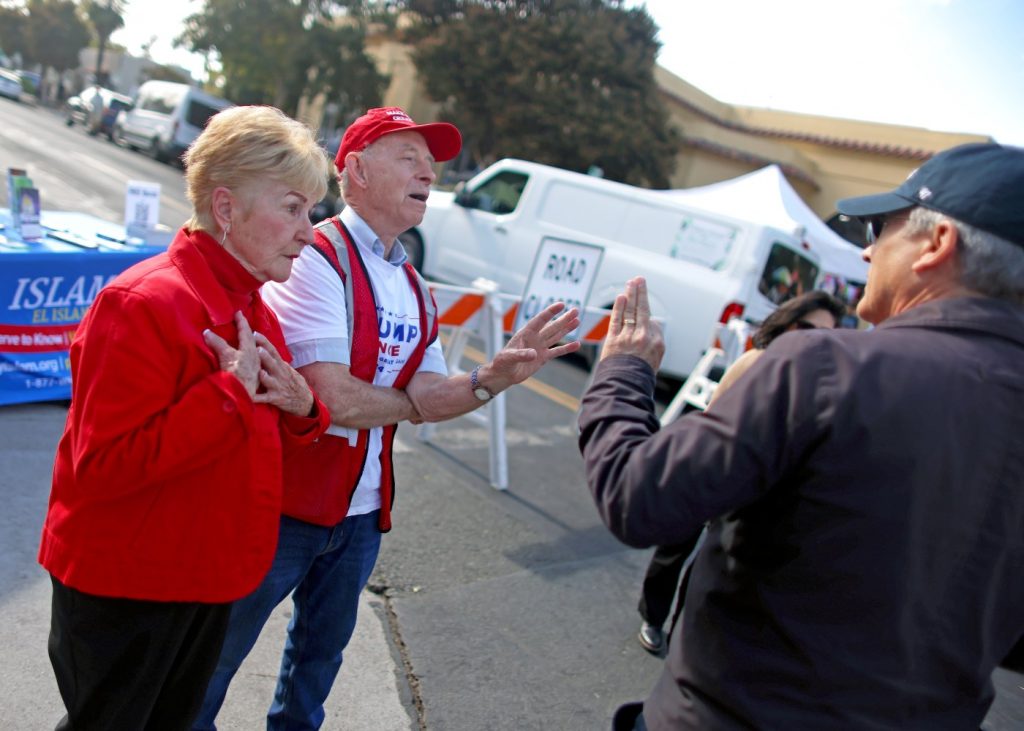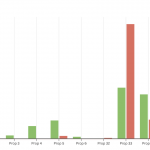In the final stretch before Election Day, with the presidential race in a dead heat, 83-year-old Republican Sandy Tate was volunteering at a Trump campaign booth at the Campbell Farmers Market when a couple pushing their toddler in a stroller passed by.
“He’s a criminal!” said the man, his voice rising.
“Do you have any idea what he accomplished when he was president for four years?” Tate, a mother of four, grandmother of 16 and barely 5 feet tall, asked.
“Chaos,” the man answered.
“(Expletive)” she said.
“You’re mean,” the man said.
“You have no brain,” she replied.
The conflict quickly escalated into a tussle.
“Don’t grab me!” he said.
California is no battleground state, but the war was on last Sunday in the South Bay, where these everyday Americans would surely have treated each other more kindly had they only met two booths down picking through the last of the season’s heirloom tomatoes.
With national polls showing the country evenly split between former President Donald Trump and Democratic Vice President Kamala Harris just days before Tuesday’s election — and each side demonizing the other through every available media stream — civil discourse has been all but lost.
“It’s very hard to be in a rational, emotionally centered, mindful place when you feel someone is attacking your entire identity and sense of values,” said Vaile Wright, senior director and a clinical psychologist of the American Psychological Association.
So it’s no surprise, she said, that tensions are spilling over in the most unlikely places.
Over the past decade, Trump’s tenure in the political arena has stirred far more mayhem than a grandma’s profanities and arm-tugging. In June 2016, for instance, a Trump rally in downtown San Jose was the scene of a bloody melee of sucker punches, thrown bottles and burned MAGA hats once protesters showed up. After Trump lost reelection in 2020, his supporters stormed the U.S. Capitol trying to stop the certification of Joe Biden’s victory.
Still, Americans feel more stressed about this election than about the 2016 or 2020 elections, according to a national survey released last week by the psychological association.
Half of adults said tension around social and political topics makes them less likely to want to connect with other people, the study found. A third of adults said they have nothing in common with people who have different political opinions and that the political climate has caused strain with their family members.
Even Juan Hernandez of Santa Clara, whose nose was broken by protesters while attending the 2016 Trump rally in his MAGA hat, senses a deeper animosity now than eight years ago.
“I talked to my manager and I’m like, ‘Can you please announce at the all-staff meeting that we don’t talk about politics the day after the election?’” said Hernandez, who works with an agency that helps the homeless in Santa Clara. “It’s like you’re an automatic racist if you vote for Trump. That’s how it is now — more than before.”
The same survey found that three in four adults said they were worried the election results could lead to violence, and more than half believed that the election could be the end of democracy in the United States.
Those sentiments were echoed at a Democratic Volunteer Center in Mountain View as more than 100 people prepared to board chartered buses before dawn Oct. 26 heading to Nevada for a final get-out-the-vote push for the Harris campaign.
“I don’t want to overstate the obvious, but Trump just scares the living daylights out of me,” said Larry Frey, 70, a film director for the tech industry.
Connie Chew, a retired paralegal from Fremont, was also worried — especially after working on a phone bank for weeks to the battleground states of Michigan, Wisconsin, Pennsylvania and Florida.
Connie Chew, of Fremont, and a volunteer from the Santa Clara County Democratic Party,, shows off her Harris-Walz campaign earrings after checking in at the Democratic Volunteer Center in Mountain View, Calif., early Saturday, Oct. 26, 2024. The SCDP volunteers gathered at the DVC, where they would depart on buses to Reno, Nev., to knock on doors for the Harris-Walz campaign. (Ray Chavez/Bay Area News Group)
“A lot of people were just very negative,” said Chew, who was also heading to Reno. “They’d just cuss and say, F-this and F-that, and F-Kamala and F-everything.”
The end of her canvassing trip made her even more concerned about the election’s outcome when she and three of her fellow volunteers — decked out in their Harris-Walz gear — stepped into an Uber in Sparks on their way back to meet the buses. The driver told them they didn’t belong in Nevada, she said, and to “go back where they came from.”
A debate about Harris and Trump ensued, she said, escalating as the driver said “Trump is all for women’s rights,” and one of the passengers described Trump as a “sexual predator.”
“I felt her car speeding up, and I’m like, holy crap,” Chew said, “and that’s when I’m like, we need to just not talk politics in this car anymore.”
Despite the deadlocked polls, Republicans tend to be more confident Trump will defy the odds — like he did in 2016 — and win on Tuesday. But many still express concern.
“I’m terrified that Kamala could possibly win,” said Robert Rissel, a retired radiology technician volunteering at the Santa Clara County Republican Party headquarters in San Jose last week who said politics has caused a strain with his 40-year-old son in San Francisco. “If the Left is in here, it is going to change the entire country. And I think it will be a very leftist, Marxist takeover.”
Robert Rissel, center, a volunteer with the Santa Clara County Republican party works to engage voters during the Downtown Campbell Weekly Farmers’ Market on Sunday, Oct. 27, 2024, in Campbell, Calif. Rissel joined a handful of Republican party volunteers handing out materials for Trump and other GOP candidates at the market in a last ditch effort to get out the vote. (Aric Crabb/Bay Area News Group)
Last Sunday at the farmers market, Rissel helped set up the Trump campaign booth with handmade signs hanging from the top that encouraged friendly discussion: “Let’s Talk” and “Let’s Listen.” The red and blue “Come See Us” sign was punctuated with a smiley face.
Tate, the Republican octogenarian, wasn’t the first to utter an obscenity. More than one anti-Trumper passing by let an F-bomb fly.
“I hate to say that to you,” she told the man with his wife pushing the stroller. “I know you’re a nice guy.”
The man was already turning away by then — perhaps his own way of de-escalating the situation.
But, with his adrenaline rushing, he turned back and faced her once again. He was a lawyer, he told her, and “I believe in the law and the Constitution. The man is a criminal. Thank you.”
As he stormed away, Tate followed, grabbing him briefly by the arm, before continuing a heated debate over juries finding Trump guilty of 34 felonies and liable for sexual abuse.
After they questioned each other’s news sources: “Do you watch Fox News?” he asked. “Do you watch CNN?” she responded, and they parted.
As for Hernandez, whose nose was broken during the San Jose melee in 2016, he is still planning to vote for Trump and likes the strength he projects. Still, there’s one aspect of the former president that leaves him disappointed.
“I just don’t see him unifying people,” he said. “And you know what? We need that.”


